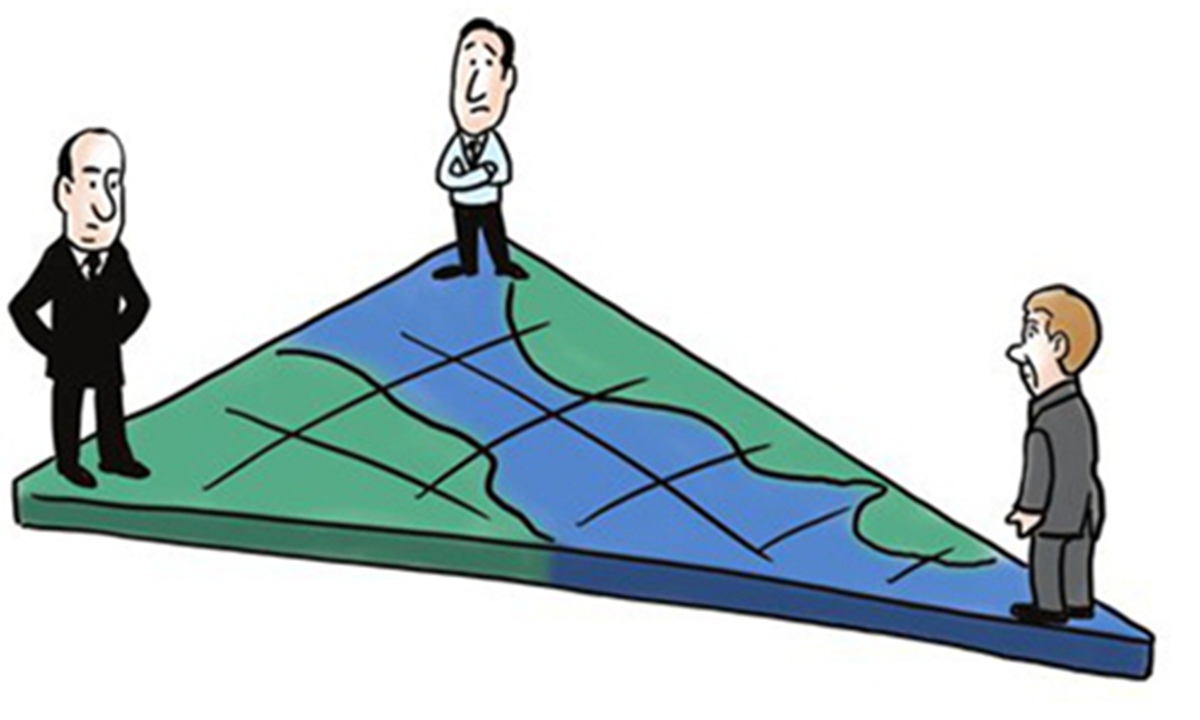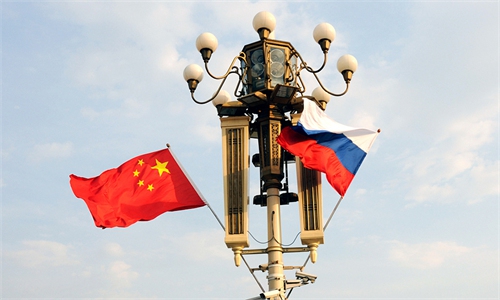
Illustration: Liu Rui/GT
When talking about Russia's relations with the West and China, Michael McFaul, former US ambassador to Russia, on Monday asked in a post on Twitter, "Is becoming a tributary state to China the best that Russia can do in the world?"McFaul's notion of tributary is popular in the West. The main basis for such a misperception is that the GDP gap between China and Russia is widening.
This rhetoric mirrors McFaul's misinterpretations about the essence of China-Russia relations in the post-Cold War era. Top leaders of China and Russia believe the bilateral relationship is at its best in history, featuring the highest degree of mutual trust. In their entire history, China-Russia relations have never been so equal. The two countries respect their mutual core interests and treat each other with equality. This is in sharp contrast to the West's condescending manner toward the two countries.
From the perspective of Western elites such as McFaul, US' hegemony is benevolent; the US and its allies are advocates of their common values, such as "democracy" and equality. Yet US' hegemonic structures have actually been based on unequal hierarchical orders. Many US elites, including McFaul himself, have established a set of conventions and stereotyped double standards. His rhetoric aims to drive a wedge between Beijing and Moscow.
The US establishment has traditionally been hostile toward Russia. Even though the Cold War has ended, old "Cold Warrior" mind-set remains well intact. One result of the long-term rivalry between the US and the Soviet Union during the Cold War was that the two sides formed stereotypes - seeing each other as their biggest rival. Although the comprehensive national strength and influence of Russia declined after the Soviet Union disintegrated in 1991, US' long-term sentiments about countering Russia seems to be very alive.
This is illustrated with Joe Biden's description of Russia as the biggest threat to US national security. It can be basically asserted that US-Russia relations can hardly return to normal for a long time to come. Furthermore, the intensified China-US competition makes it more possible for China and Russia to boost their bilateral ties.
In the same post, McFaul also said that "Putin and his party want decoupling from Europe and need the West as an enemy." His words on Russia's relations with Europe suggest that he seems to have misread the philosophy of Russia's diplomatic struggle.
Russia has been taking a tough stance toward the EU for some time. Russian Foreign Minister Sergei Lavrov said on February 12 that "we assume that we are ready [to break relations with the EU] if we see again - as we have often felt - that in some areas sanctions are imposed, creating threats to our economy, including in the most acute spheres." But this is only one side of the coin.
It is clear that Moscow's intention is to work bilaterally with relatively objective, neutral and friendly members of the EU. It does not want to let hostile anti-Russian rhetoric dominate Brussels' policy toward Russia.
Decoupling, in other words, has never been a priority of Russia's EU policies. Instead, Moscow has tried to establish red lines with a strong gesture to prevent the situation from spiraling out of control. Russia has expressed many times its willingness to be an equal partner with the West. This means that it was not that Moscow does not want it - it signals it cannot get. McFaul's words are suspected of turning "white" into "black."
More precisely, China-Russia relations offer a different possible scenario for state-to-state relations to US hegemony, but don't aim to play an alternative role. As a general trend, the rising power of emerging economies such as China and Russia in international affairs may not change. At the same time, as permanent members of the UN Security Council, China, the US and Russia should enhance mutual trust. The three should take the lead to uphold rules-based international order, jointly respond to global challenges and threats, and improve the global governance system.
The author is professor of Shanghai International Studies University and executive president of the Shanghai Academy of Global Governance and Area Studies. opinion@globaltimes.com.cn



